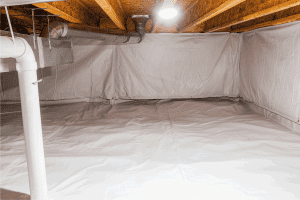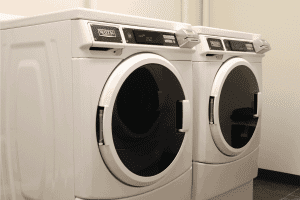Crawl spaces are one of many different types of house foundations. The main difference from a basement is that crawl spaces are open and vented outside to the elements. Since they are open, is it normal for crawl spaces to be damp? In this article, we have methodically researched and found the answer to that question.
Yes, it is common for crawl spaces to be damp because of their exposure to the elements, especially if you have not set up any sort of protection against moisture. Even though this is normal, you should take action to combat this as this can cause damage to your crawl space and eventually your house.
Continue reading as we discuss more details about this topic like how to remove moisture from your crawl space, whether encapsulating your crawl space adds value, and much more.
![Basement or crawl space with upper floor insulation and wooden support beams. An area of limited height. Should A Crawl Space Be Damp [With 4 Moisture Reduction Solutions]](https://basementing.com/wp-content/uploads/2022/01/crawl-space-with-upper-floor-insulation-and-wooden-support-beams.-Should-A-Crawl-Space-Be-Damp-With-4-Moisture-Reduction-Solutions-683x1024.png)
Is a damp crawl space normal?
A damp crawl space means that your house is slowly getting attacked by moisture which can cause mold and mildew growth. It is normal as this is also a process of oxidation, especially on wood.
The main culprit for this is the weather brought by the seasons. Rainy and snowy seasons contribute largely as this is the time of the year where the bulk of the moisture is present.
Even during summer as warmer air is packed with water vapor, the crawl space is exposed to lingering humidity.
Why have a crawl space in the first place?
You might ask, if a setup like a crawl space causes too much moisture, then why have one at all? Well, this is because of the low cost and accessibility that it provides. By building your home elevated above the ground, there are some advantages that it brings.
- Excavation for your house is shallower and less work intensive, as you won't have to dig deeply to install a foundation or concrete pad. If the ground is uneven, it is also easier to just level it rather than digging a hole for the entire foundation
- Intallations of HVAC systems and plumbing are easier as the floor is elevated. It is also very easy to check underneath of the house for maintenance.
There are good reasons why a house with a crawl space is a reasonable choice. If you are constructing or choosing a house, you can consider these factors on the benefits of a crawl space. Although there are drawbacks to this style of the house, there are always things you can do to combat it.
Before continuing, you might be interested in one of our previous articles about crawl spaces that talks about sump pumps titled, "Does A Crawl Space Need a Sump Pump?"

How do I get moisture out of my crawl space?
There are multiple choices for you to pursue to remove moisture from your crawl spaces. We took the liberty to list some of them down for you, so check it out to choose which system will best your situation.
Dehumidifying
A crawl space air quality isn’t always at its finest. Humidity levels are always rising to make mold growth very easy.
A dehumidifier does exactly what it's called. It dehumidifiers the air present in your crawl space by removing water vapor and pumping back dry air that is harmless to the components of your crawl space.
Sump pumps
Having a sump pump installed in your crawl space prevents it from flooding. Flooding can cause very significant damage to your house, not just your crawl space.
When submerged for long, wood -which is the common material that crawl spaces are made of- becomes brittle and shortens its lifespan. Investing in a sump pump is very useful when things like this happen.
Sump pumps work automatically and do not need any turning on or off. Perfect for situations where you don't know that there is already a significant amount of water in your crawl spaces.
Living in places where rain is regular, your crawl spaces might already be submerged in water all the time without you even knowing. Here, sump pumps are perfect for these conditions,

Vapor barriers
A lot of moisture comes from the ground. A vapor barrier is placed on the soil to block the moisture from leaching onto your crawl space.
We have previously written an article about vapor barriers titled, "Does A Basement Ceiling Need A Vapor Barrier?"
Does crawl space encapsulation add value to a house?
Crawl space encapsulation is the total sealing of a crawl space, from the floor to the walls. It is the ultimate method to combat moisture and water damage as it wraps your entire crawl space serving as a seal from the outside.
We recommend that when doing this, sealing the entire crawl space completely for maximum benefits.
Crawl space encapsulation adds value to your house as this is an additional maintenance feature. Furthermore, it helps in preserving the integrity of the house by protecting it from being destroyed. The clamor for such amenities built-in for a house is high, thus raising the value of the property.
An encapsulated crawl space also signifies that the house is taken care of and is currently in good condition making the living quality in the house high.

How much does it cost to encapsulate a crawl space?
The national average for crawl space encapsulation is $5,500, with a total cost for encapsulation ranging anywhere from $1,500 to $15,000. The exact prices will still vary based on your situation as these are just estimates.
It will depend on the size of your crawl space and if any repairs are needed before being able to install the encapsulation on your crawl space.

Can I turn my crawl space into a basement?
Yes, you can turn your crawl space into a full basement but this project is no joke and can cost a significant amount of money. Turning a crawl space into a basement would require you to hire construction contractors and an engineer as you cannot DIY projects like this.
This can be considered as a full renovation as the foundation of your house will be affected. As we mentioned earlier, one of the unique traits of crawl spaces is that they don't require you to dig a deep hole for the erection of your house.
With a basement, a full excavation would be done, some parts of the house would be temporarily demolished to start the excavation. Special equipment would be required to finish the job faster and with sufficient labor.
Planning and consultation with an engineer are very important to budget for all necessary aspects of this job. But turning your crawl space to a full basement would raise the value of your home higher than just adding an encapsulated crawl space.
Cost of crawl space to basement transformation
Converting a crawl space to a basement can cost you $50 per square foot with pieces starting from $35 to $75. The price would heavily depend on what size your intended basement would be. You would also have to take into consideration the designs and the interior finishing for your basement.
Another option would be to renovate it to a walkout basement. This is a more expensive upgrade but is an additional increase to the overall value of your house. It is also noteworthy that adding new parts to your house such as walkout basements also increases your property taxes.
![A crawl space with air mover to dry out the structure. Should A Crawl Space Be Damp [With 4 Moisture Reduction Solutions]](https://basementing.com/wp-content/uploads/2021/12/A-crawl-space-with-air-mover-to-dry-out-the-structure.-Should-A-Crawl-Space-Be-Damp-With-4-Moisture-Reduction-Solutions-1024x683.png)
In conclusion
Even though it is common for crawl spaces to be damp, you should not be okay with it, as this can cause mold or rotting that can result in severe damage to your crawl spaces. There are multiple choices to pick from for your crawl space protection. Adding protection such as crawl space encapsulation also adds value to your house.

![A series of pipes for the water heater, Can You Put A Water Heater In A Crawl Space [Including Tankless]](https://basementing.com/wp-content/uploads/2022/01/A-series-of-pipes-for-the-water-heater-300x200.jpg)

